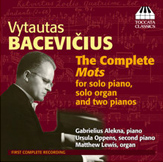After the inspiring success of the first recording of symphonic music by Lithuanian composer Vytautas Bacevičius, Toccata Classics continues its discovery of Bacevičius’s music by offering its second release “The Complete Mots” which includes seven Bacevičius’ compositions for keyboard instruments. The launch of the CD took place on Wednesday, 25 January 2012, at 6.30pm, at the Lithuanian Embassy in London, introduced by the author of several books and long-established record reviewer for Gramophone and BBC Music Magazine, Malcolm MacDonald, and initiator of the CD project and recording artist, pianist Gabrielius Alekna.
Lithuanian-born pianist and composer
Vytautas Bacevičius (1905–70) was one of the pioneers of the twentieth-century music, born into a cultured and highly musical family of joint Polish-Lithuanian origin, brother of the gifted Polish composer and violinist Grażyna Bacewicz (1909–69). While she remained in
Poland with their mother, and adopted the Polish form of the family name, Bacevičius moved to
Lithuania in 1926 to join his father, who had settled in
Kaunas.
His series of seven Mots (‘Words’) for keyboard – five for solo piano, one for organ and one for two pianos – were written between 1933 and 1966 and show the evolution of his musical language from the post-Scriabinian style of the early works, via the influence of Prokofiev and Stravinsky, to highly individual and visionary modernism, akin to that of two fellow radicals, Edgard Varèse and Stefan Wolpe.
However, as Gordon Rumson writes in Music&Vision, “Bacevicius' sound world might easily be equated with others from the time, from earlier, or later. No, it is not required. […] if you want to hear the reflections of a man whose life was difficult, harsh, perhaps even depressing and who tried to find meaning and significance in these outward matters in order to convert them into an inner reflecting life of sound, then try these pieces by
Bacevicius. He had much to say and said it very well.”
Guy Rickards in Gramophone: “In the late 1950s he returned to a more advanced style, a "cosmic music" (of the inner cosmos of Man rather than Space), represented hereby the turbulent Sixth Symphony (1960) and brilliant Graphique (1964) — the latter in particular showing what a fine composer Bacevičius was at his best. These fine performances and recordings (from 2003-05) give this colourful music the best possible platform.”
Tim Ashley in The Guardian: “mystic, introverted scores – startling in their austerity. The performances are first rate.”
Rick Jones in New Statesman: “It’s an excellent sound. The Second Symphony… couldn’t be clearer in its stark expression of anger and anxiety at the European folly. […] I was struck by the depth of passionate feeling running through both the music and the performances.”
Derek Warby in MusicWeb International: “I was immediately struck by the power and originality of what I heard and wondered how on earth this could have been the first time I had had the opportunity to hear any of these works… For anyone remotely interested in Eastern European Music and particularly from between the wars, this is a ‘must have’. Like me you will, I am sure, make a wonderful discovery.”
Toccata Classics was launched in 2005 to record “forgotten music by great composers and great music by forgotten composers” (Robert Reilly). The label now has over 80 CDs in the catalogue, with recordings of music by Alkan, Alnaes, Ashton, Bach, Beethoven, Brian, Eller, Lavista, Lyadov, David Matthews, Nin-Culmell, Oppel, Rameau, Ramey, Shebalin, Shostakovich, Sinigaglia, Boris Tchaikovsky, Nikolai Tcherepnin, Telemann, Vasilenko, Weinberg and many more. In the pipeline are recordings of Brahms, Enescu, Korndorf, Lyatoshynsky, Reicha, Roentgen and two CDs by the Lithuanian composer Vladas Jakubėnas. The label also runs a Discovery Club, which gives discounted access to all the new releases long before they come in the shops. Details at http://www.toccataclassics.com/.
To pre-order or purchase CD please visit:
http://www.toccataclassics.com/cddetail.php?CN=TOCC0134
LMIPC info

